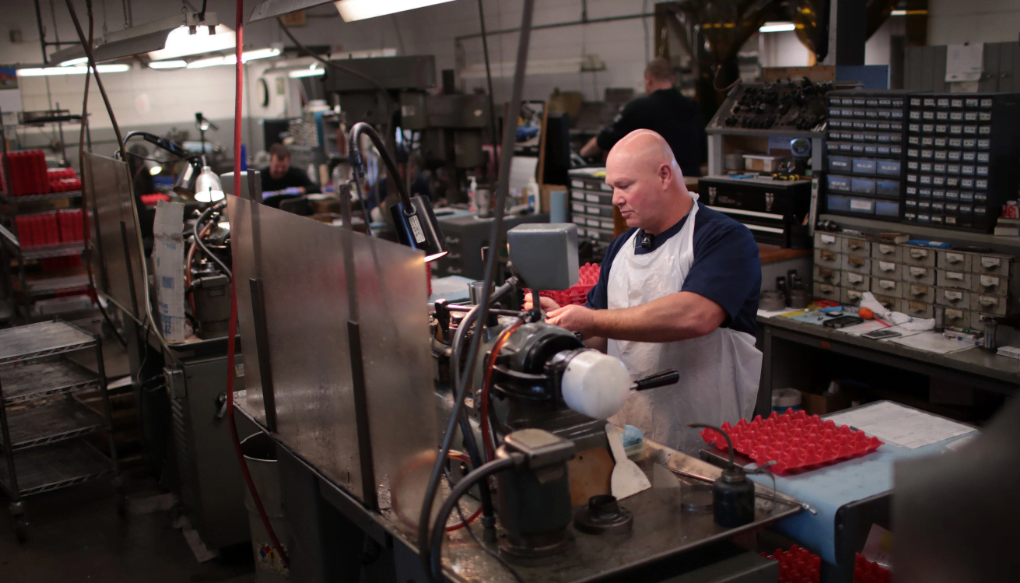how many jobs are available in capital goods, The capital goods industry plays a crucial role in supporting economic growth by producing machinery, equipment, and other goods used in the production of goods and services. This sector encompasses a wide range of industries, such as manufacturing, construction, and engineering. In this essay, we will explore the abundance of jobs available in the capital goods industry, highlighting its significance and the various employment opportunities it offers.
What are capital goods?
Capital goods are durable goods that are used in the production of other goods and services. They are physical assets, such as machinery, equipment, tools, and buildings, that facilitate the production process and enhance productivity. Capital goods are typically used by businesses and industries to manufacture products or provide services. Examples of capital goods include manufacturing machinery, construction equipment, computer systems, and transportation vehicles. These assets play a vital role in driving economic growth and development by enabling businesses to produce goods and services efficiently.
how many jobs are available in capital goods
The capital goods industry is a broad category that includes the manufacturing of durable goods used in the production of other goods and services. This includes machinery, equipment, and tools. The industry is a major driver of economic growth, and it is expected to continue to grow in the coming years.
According to the Bureau of Labor Statistics (BLS), there were approximately 1.3 million jobs in the capital goods industry in the United States in 2021. The industry is expected to grow by 2.2% from 2021 to 2031, which is slower than the average growth rate for all occupations. However, the capital goods industry is still expected to create approximately 24,900 new jobs over the ten-year period.
The majority of jobs in the capital goods industry are located in manufacturing centers, such as the Midwest and Northeast. However, there are also a significant number of jobs in the industry in other parts of the country, such as the South and West.
The capital goods industry is a diverse industry, and there are a variety of jobs available. Some of the most common jobs in the industry include:
- Machinists: Machinists operate machines to cut, shape, and form metal and other materials.
- Welders: Welders join pieces of metal together using heat and pressure.
- Assemblers: Assemblers put together components to make finished products.
- Engineers: Engineers design, develop, and test products.
- Sales representatives: Sales representatives sell capital goods to businesses and other organizations.
If you are interested in a career in the capital goods industry, there are a few things you can do to prepare. First, you should get a good education. Many employers in the industry require a bachelor’s degree in engineering, manufacturing, or a related field. Second, you should gain experience. You can do this by working in a manufacturing plant or by volunteering with a local engineering or manufacturing organization. Finally, you should network with people in the industry. This will help you learn about job openings and get your foot in the door.
Overview of the Capital Goods Industry To understand the job opportunities in the capital goods sector, it’s essential to grasp its scope and importance. The capital goods industry includes manufacturers of machinery, industrial equipment, construction materials, and other products used in the production process. It provides essential tools and infrastructure for businesses across various sectors.
Manufacturing Sector The manufacturing sector within the capital goods industry offers a multitude of job opportunities. This includes roles in the production, assembly, and maintenance of machinery and equipment. Jobs such as mechanical engineers, production supervisors, quality control specialists, and machine operators are in demand to ensure the efficient manufacturing of capital goods.
Construction Industry The construction sector heavily relies on capital goods for infrastructure development. Jobs in this industry include civil engineers, architects, project managers, equipment operators, and construction workers. These professionals work on projects ranging from residential buildings to large-scale infrastructure, utilizing capital goods like construction machinery, cranes, and specialized equipment.
Engineering and Design The capital goods industry also requires skilled engineers and designers who specialize in developing innovative machinery and equipment. Roles such as product engineers, mechanical designers, and research and development specialists are instrumental in creating advanced capital goods that meet industry demands and technological advancements.
Sales and Marketing The capital goods sector requires a robust sales and marketing force to promote and distribute products to businesses. Sales representatives, account managers, and marketing professionals play vital roles in understanding customer needs, establishing relationships with clients, and driving sales of capital goods. Their efforts contribute to the growth and profitability of capital goods manufacturers.
Service and Maintenance Capital goods often require regular maintenance and repair to ensure optimal performance and longevity. Jobs in service and maintenance include field technicians, maintenance engineers, and customer support specialists. These professionals are responsible for diagnosing and resolving equipment issues, conducting preventive maintenance, and providing technical support to customers.
Supply Chain and Logistics Efficient supply chain management is crucial in the capital goods industry. Professionals in supply chain and logistics oversee the procurement, transportation, and distribution of capital goods. Jobs in this sector include supply chain managers, logistics coordinators, and warehouse supervisors, ensuring timely delivery of capital goods to customers.
Research and Development The capital goods industry thrives on innovation and technological advancements. Research and development (R&D) professionals play a crucial role in designing and improving capital goods. Jobs in R&D include scientists, engineers, and technologists who explore new materials, processes, and technologies to enhance the performance and efficiency of capital goods.
How many jobs are available in the capital goods industry?
The capital goods industry is a significant contributor to the global economy and offers a wide range of job opportunities. The exact number of jobs available in the industry may vary depending on factors such as economic conditions, technological advancements, and industry trends. However, it is worth noting that the capital goods industry encompasses various sectors, including manufacturing, construction, transportation, and information technology. Collectively, these sectors provide a substantial number of jobs worldwide, ranging from skilled labor positions to managerial roles and technical professions.
What are the most common jobs in the capital goods industry?

The capital goods industry offers diverse career paths and job roles. Some of the most common jobs in the industry include:
Mechanical Engineer: Mechanical engineers play a crucial role in designing, developing, and maintaining capital goods. They are responsible for creating efficient and reliable machinery and equipment.
Industrial Designer: Industrial designers focus on the aesthetics and functionality of capital goods. They develop innovative designs that enhance user experience and meet market demands.
Production Manager: Production managers oversee the manufacturing process and ensure that capital goods are produced efficiently and according to quality standards. They coordinate tasks, manage resources, and optimize production operations.
Sales Engineer: Sales engineers act as a bridge between the capital goods industry and customers. They understand customer needs, provide technical expertise, and promote capital goods to potential buyers.
Maintenance Technician: Maintenance technicians are responsible for the repair, troubleshooting, and maintenance of capital goods. They ensure that the equipment operates smoothly and efficiently to minimize downtime.
What are the qualifications for jobs in the capital goods industry?
The qualifications for jobs in the capital goods industry can vary depending on the specific role and level of expertise required. Generally, a combination of education, technical skills, and experience is valued in the industry. Some common qualifications include:
Education: Many positions in the capital goods industry require a relevant bachelor’s degree, such as mechanical engineering, industrial design, manufacturing engineering, or a related field. Advanced degrees or specialized certifications may be required for higher-level roles.
Technical Skills: Proficiency in technical areas such as engineering design software, computer-aided manufacturing, programming languages, and equipment operation is often necessary. Familiarity with industry-specific tools and technologies is also beneficial.
Experience: Hands-on experience through internships, co-op programs, or entry-level positions can provide valuable practical knowledge and increase job prospects. Industry certifications and professional affiliations demonstrate expertise and commitment to professional growth.
Soft Skills: Strong problem-solving, communication, teamwork, and project management skills are highly valued in the capital goods industry. The ability to adapt to changing technologies and work collaboratively in a fast-paced environment is crucial.
How do I find a job in the capital goods industry?
To find a job in the capital goods industry, consider the following strategies:
Research and Networking: Stay updated on industry trends, companies, and job openings by actively researching online job portals, industry publications, and professional networking platforms. Attend industry events, job fairs, and trade shows to connect with professionals and learn about job opportunities.
Internships and Co-op Programs: Seek internships or cooperative education programs offered by companies in the capital goods industry. These experiences can provide valuable industry exposure, enhance skills, and potentially lead to full-time job offers.
Professional Associations: Join professional associations and organizations related to the capital goods industry. These groups often provide job boards, networking events, and resources for career development.
Direct Applications: Visit the websites of capital goods companies and check their career sections for job openings. Tailor your resume and cover letter to highlight your relevant skills and experiences.
Utilize Career Services: Seek assistance from career services offices at universities or colleges. They can provide guidance on job search strategies, resume writing, interview preparation, and connecting with industry contacts.
By leveraging these strategies and showcasing your qualifications and passion for the capital goods industry, you can increase your chances of finding a rewarding job in this dynamic field.
Conclusion, The capital goods industry offers a wide range of job opportunities across manufacturing, construction, engineering, sales, service, supply chain, and research and development. It plays a critical role in supporting economic growth and providing essential tools and infrastructure for businesses. As industries continue to advance and modernize, the demand for skilled professionals in the capital goods sector remains steady. Individuals seeking diverse and rewarding careers will find ample opportunities within this vital industry.

